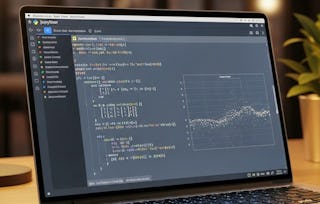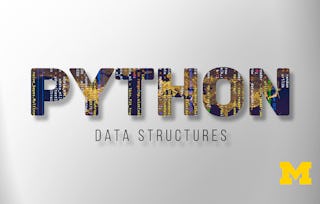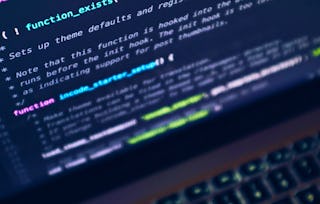This course is designed to equip learners with a foundational and functional understanding of Python programming through the progressive exploration of core logic and data-handling structures. Through real-world examples and carefully sequenced lessons, students will learn to apply control flow, construct efficient loops, evaluate Boolean logic, and manipulate complex data collections like dictionaries and lists.
抓住节省的机会!购买 Coursera Plus 3 个月课程可享受40% 的折扣,并可完全访问数千门课程。

您将获得的技能
您将学习的工具
要了解的详细信息

可分享的证书
添加到您的领英档案
作业
11 项作业
授课语言:英语(English)
了解顶级公司的员工如何掌握热门技能

积累特定领域的专业知识
本课程是 Python Mastery: Core Concepts, Data Structures & OOP 专项课程 专项课程的一部分
在注册此课程时,您还会同时注册此专项课程。
- 向行业专家学习新概念
- 获得对主题或工具的基础理解
- 通过实践项目培养工作相关技能
- 获得可共享的职业证书

从 Software Development 浏览更多内容
 状态:免费试用
状态:免费试用 状态:免费试用
状态:免费试用University of Michigan
人们为什么选择 Coursera 来帮助自己实现职业发展

Felipe M.
自 2018开始学习的学生
''能够按照自己的速度和节奏学习课程是一次很棒的经历。只要符合自己的时间表和心情,我就可以学习。'

Jennifer J.
自 2020开始学习的学生
''我直接将从课程中学到的概念和技能应用到一个令人兴奋的新工作项目中。'

Larry W.
自 2021开始学习的学生
''如果我的大学不提供我需要的主题课程,Coursera 便是最好的去处之一。'

Chaitanya A.
''学习不仅仅是在工作中做的更好:它远不止于此。Coursera 让我无限制地学习。'
学生评论
- 5 stars
81.81%
- 4 stars
9.09%
- 3 stars
0%
- 2 stars
0%
- 1 star
9.09%
显示 3/11 个
CC
已于 Oct 30, 2025审阅
Learners appreciated how it strengthened both logic and problem-solving skills effectively.
ON
已于 Dec 4, 2025审阅
Instead of just teaching syntax, the lessons push you to understand how to think through a problem. Lots of small logic exercises help sharpen analytical skills.
GG
已于 Jan 1, 2026审阅
Great for understanding logic step by step






